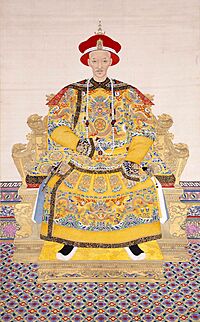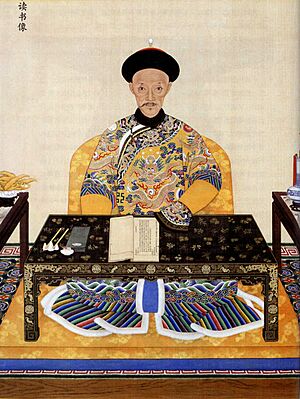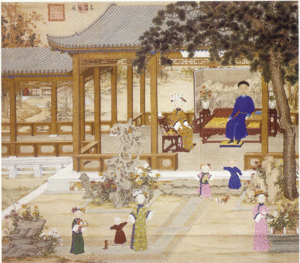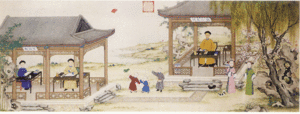Daoguang Emperor facts for kids
Quick facts for kids Daoguang Emperor道光帝 |
|||||||||||||||||
|---|---|---|---|---|---|---|---|---|---|---|---|---|---|---|---|---|---|
 |
|||||||||||||||||
| Emperor of the Qing dynasty | |||||||||||||||||
| Reign | 3 October 1820 – 26 February 1850 | ||||||||||||||||
| Predecessor | Jiaqing Emperor | ||||||||||||||||
| Successor | Xianfeng Emperor | ||||||||||||||||
| Prince Zhi of the First Rank | |||||||||||||||||
| Tenure | 1813 – 3 October 1820 | ||||||||||||||||
| Born | 16 September 1782 (乾隆四十七年 八月 十日) Xiefang Hall, Forbidden City, Beijing |
||||||||||||||||
| Died | 26 February 1850 (aged 67) (道光三十年 正月 十五日) Imperial Gardens, Beijing |
||||||||||||||||
| Burial | Mu Mausoleum, Western Qing tombs | ||||||||||||||||
| Consorts |
Empress Xiaomucheng
(m. 1796; died 1808)Empress Xiaoshencheng
(m. 1809; died 1833)Empress Xiaoquancheng
(m. 1821; died 1840)Empress Xiaojingcheng
(m. 1825) |
||||||||||||||||
| Issue |
|
||||||||||||||||
|
|||||||||||||||||
| House | Aisin-Gioro | ||||||||||||||||
| Dynasty | Qing | ||||||||||||||||
| Father | Jiaqing Emperor | ||||||||||||||||
| Mother | Empress Xiaoshurui | ||||||||||||||||
| Daoguang Emperor | |||||||||||
|---|---|---|---|---|---|---|---|---|---|---|---|
| Chinese | 道光帝 | ||||||||||
|
|||||||||||
The Daoguang Emperor (born September 16, 1782 – died February 26, 1850) was a powerful ruler. He was the seventh emperor of the Qing dynasty in China. His personal name was Mianning, later changed to Minning. He was also known by his temple name, Emperor Xuanzong of Qing.
His time as emperor was very challenging. China faced big problems from outside and inside the country. These included the First Opium War and the start of the Taiping Rebellion. These events almost caused the Qing dynasty to fall apart. Historian Jonathan Spence described the Daoguang Emperor as a "well-meaning but ineffective man." He often chose officials who had strong beliefs but no clear plans for solving the country's problems.
Contents
Early Life and Family
The Daoguang Emperor was born in the Forbidden City in Beijing in 1782. His birth name was Mianning. Later, when he became emperor, his name was changed to Minning. This change was made to avoid using a common Chinese character in the emperor's personal name. This was a tradition started by his grandfather, the Qianlong Emperor.
Mianning was the second son of Prince Yongyan. Prince Yongyan was the 15th son of the Qianlong Emperor. Even though Mianning was the second son, he was first in line to his grandfather's throne after his father. This was because his mother, Lady Hitara, was his father's main wife. His older brother was born to a different mother.
The Qianlong Emperor liked Mianning very much. Mianning often went hunting with his grandfather. When he was nine years old, Mianning successfully hunted a deer. This made the Qianlong Emperor very happy. Five years later, in 1796, the Qianlong Emperor stepped down from the throne. Mianning was 14 at the time. His father, Prince Yongyan, became the Jiaqing Emperor. Lady Hitara, Mianning's mother, became the empress. The Qianlong Emperor lived three more years in retirement. He died in 1799 when Mianning was 17.
In 1813, while he was still a prince, Mianning showed his bravery. He helped fight off invaders from a group called the Eight Trigrams. These invaders had stormed the Forbidden City.
Ruling as Emperor

In September 1820, Mianning became emperor at 38 years old. His father, the Jiaqing Emperor, had died suddenly. Mianning was the first Qing emperor who was the oldest legitimate son of his father. He was now known as the Daoguang Emperor. His era name, "Daoguang," means "radiant path."
He became emperor of an empire that was already facing problems. Western countries were starting to have more influence near China's borders.
Khoja Rebellion in Xinjiang

Six years into his rule, an exiled leader named Jahangir Khoja attacked Xinjiang. He came from Kokand. By late 1826, several important cities in Xinjiang had fallen to the rebels. These included Kashgar and Yarkand.
In March 1827, Khoja was captured after a friend betrayed him. He was sent to Beijing and later executed. The Qing Empire then took back control of the lost areas.
The First Opium War
The Daoguang Emperor was very concerned about opium. Opium was a drug that was being brought into China. He issued many orders in the 1820s and 1830s to ban it. He appointed Lin Zexu to stop the spread of opium in Canton.
Lin Zexu's efforts to stop opium led to the First Opium War. China lost this war. Lin Zexu was blamed for the defeat. The Daoguang Emperor removed him from his position and sent him away.
During the war, the Daoguang Emperor ordered the execution of 187 British and Indian prisoners of war. This happened in Taiwan in 1842. China's defeat in the war showed that its military was not as strong as European forces. This led to China being forced to give Hong Kong to the British. This was part of the Treaty of Nanjing in August 1842. China also had to pay a large amount of money, which left the treasury very low on funds.
Views on Christianity
In 1811, a rule was added to Chinese law. It said that Europeans could be sentenced to death for spreading Catholicism. This law was part of a larger rule about "Prohibitions Concerning Sorcerers and Sorceresses."
Some hoped that the government would treat Protestantism differently from Catholicism. However, after Protestant missionaries gave Christian books to Chinese people in 1835 and 1836, the Daoguang Emperor wanted to know who the "traitorous natives" were in Guangzhou who had helped them.
Death and Legacy
The Daoguang Emperor passed away on February 26, 1850. He died at the Old Summer Palace, which was about 8 kilometers (5 miles) northwest of Beijing. He was the last Qing emperor to die in that palace. The palace was later burned down by Anglo-French troops during the Second Opium War.
His oldest son who was still alive, Yizhu, became the next emperor, known as the Xianfeng Emperor.
The Daoguang Emperor did not fully understand the European powers. He also didn't understand the big changes happening in Europe, like the Industrial Revolution. He preferred to ignore what was happening in the rest of the world. It was even said that he didn't know where Britain was located.
His 30-year rule saw growing money problems and unrest within China. There were also more foreign countries getting involved in China's affairs. These challenges would eventually lead to the fall of the Qing dynasty in 1911.
The Daoguang Emperor was buried in the Mu Mausoleum complex. This complex is part of the Western Qing Tombs, southwest of Beijing.
Family
Empresses
- Empress Xiaomucheng (孝穆成皇后)
- Empress Xiaoshencheng (孝慎成皇后)
- Princess Duanmin of the First Rank (端憫固倫公主; born 1813 – died 1819), first daughter
- Empress Xiaoquancheng (孝全成皇后)
- Princess Duanshun of the First Rank (端順固倫公主; born 1825 – died 1835), third daughter
- Princess Shou'an of the First Rank (壽安固倫公主; born 1826 – died 1860), fourth daughter
- Yizhu (奕詝), the Xianfeng Emperor (咸豐帝; born 1831 – died 1861), fourth son
- Empress Xiaojingcheng (孝靜成皇后)
- Yigang (奕綱), Prince Shunhe of the Second Rank (順和郡王; born 1826 – died 1827), second son
- Yiji (奕繼), Prince Huizhi of the Second Rank (慧質郡王; born 1829 – died 1830), third son
- Princess Shou'en of the First Rank (壽恩固倫公主; born 1831 – died 1859), sixth daughter
- Yixin (奕䜣), Prince Gongzhong of the First Rank (恭忠親王; born 1833 – died 1898), sixth son
Imperial Noble Consort
- Imperial Noble Consort Zhuangshun (莊順皇貴妃)
- Yixuan (奕譞), Prince Chunxian of the First Rank (醇賢親王; born 1840 – died 1891), seventh son
- Princess Shouzhuang of the First Rank (壽莊固倫公主; born 1842 – died 1884), ninth daughter
- Yihe (奕詥), Prince Zhongduan of the Second Rank (鐘端郡王; born 1844 – died 1868), eighth son
- Yihui (奕譓), Prince Fujing of the Second Rank (孚敬郡王; born 1845 – died 1877), ninth son
Noble Consorts
- Noble Consort Tong (彤貴妃)
- Princess Shouxi of the Second Rank (壽禧和碩公主; born 1842 – died 1866), eighth daughter
- Noble Consort Jia (佳貴妃)
- Noble Consort Cheng (成貴妃)
Consorts
- Consort He (和妃)
- Yiwei (奕緯), Prince Yinzhi of the Second Rank (隱志郡王; born 1808 – died 1831), first son
- Consort Xiang (祥妃)
- Princess Shouzang of the Second Rank (壽臧和碩公主; born 1829 – died 1856), fifth daughter
- Yicong (奕誴), Prince Dunqin of the First Rank (惇勤親王; born 1831 – died 1889), fifth son
- Consort Chang (常妃)
Concubines
- Concubine Tian (恬嬪)
- Concubine Shun (順嬪)
- Concubine Yu (豫嬪)
- Concubine Heng (恆嬪)
Noble Ladies
- Noble Lady Ping (平貴人)
- Noble Lady (貴人) of the Li clan
- Noble Lady Na (那貴人)
- Noble Lady Ding (定貴人)
Second Class Attendant
- Second Class Attendant Mu (睦答應)
Lady-in-waiting
- Lady-in-waiting (劉官女子) of the Liu clan
See also
- Family tree of Chinese monarchs (late)
- Treaty of Nanjing (1842)
 | Jessica Watkins |
 | Robert Henry Lawrence Jr. |
 | Mae Jemison |
 | Sian Proctor |
 | Guion Bluford |





